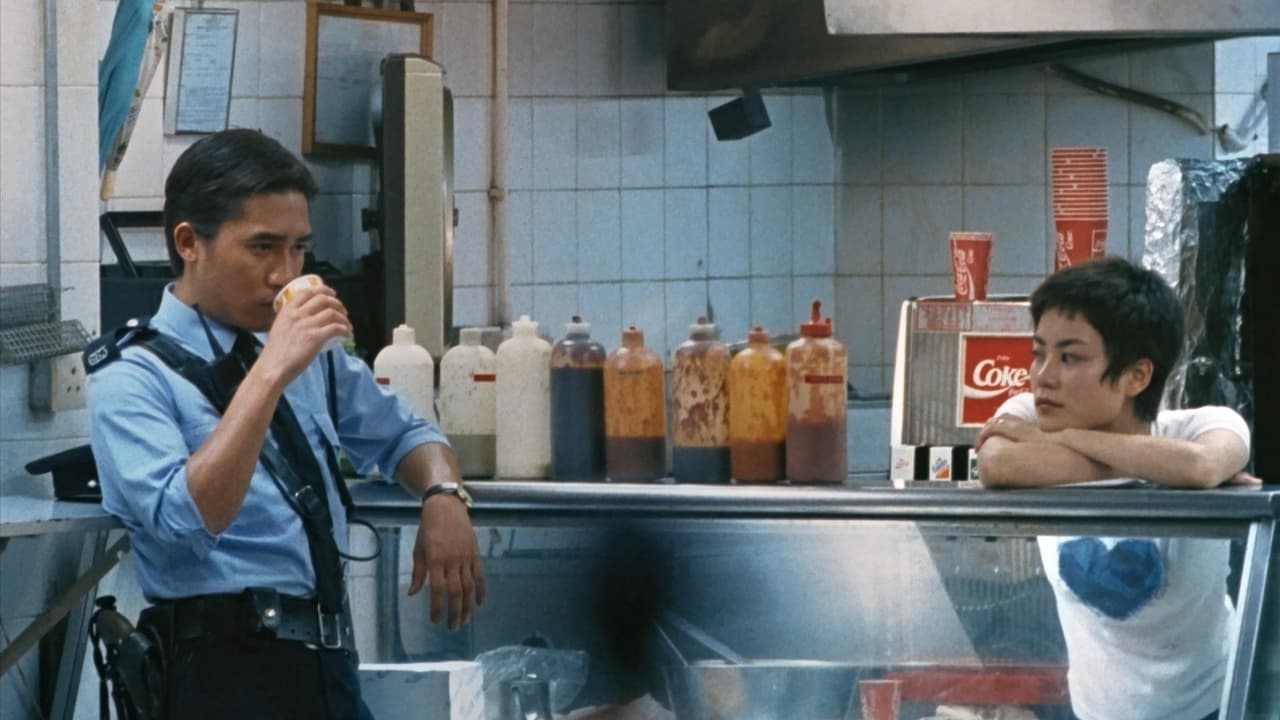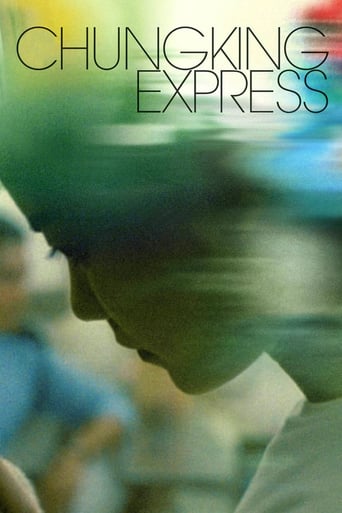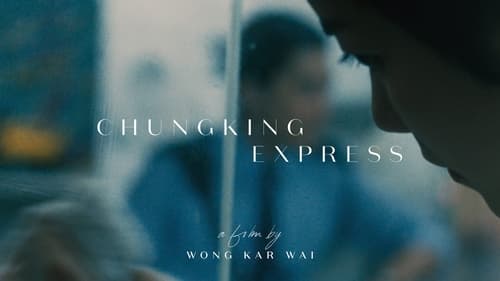



terrible... so disappointed.
The acting is good, and the firecracker script has some excellent ideas.
View MoreWhile it is a pity that the story wasn't told with more visual finesse, this is trivial compared to our real-world problems. It takes a good movie to put that into perspective.
View MoreWorth seeing just to witness how winsome it is.
Chunking express is one of Wong Kar Wai's masterpieces. The narrative is split in two: the first part portrays scenes of the life of a cop, a guy who was dumped by his girlfriend and keeps eating pineapple while waiting for her to come back; and a woman, a drug dealer that coordinates a group of Indians that transport the drug to outside the country. The second part has as main character a girl that works at her uncle's snack bar and dreams about going to California; and a police officer that was, as the one from the first part, dumped by his girlfriend and keeps suffering and waiting for her. All those characters live their lives in a busy Hong Kong. All of Kar Wai aesthetic marks are visible in this film: the use of lighting to dye the shots with deep colors, in case of this film, blue and green; a catching soundtrack with theme songs for each character and plot; the use of a narrator that gives voice to character's thoughts; a lot of tracking, slow motion and fast motion; and characters with strong personalities. The main theme that surrounds this film is the idea of time limit, or expiration date - there are many elements related to this theme, and the narrator keeps wondering about it. Also, what calls my attention is the contrast between female and male characters. While both male characters have been dumped by their girlfriends and the only thing they do is sit and wait for them to come back, the female characters are strong and independent. They are powerful; they travel around the world and follow their dreams. Chunking Express is a very artistic and deep film, and certainly one of my favorites.
View MoreOne centimetre separates the two stories of Chungking Express. Two cops drift in the aftermath of the breakdown of long term relationships. Cop 223 wanders and buys cans of pineapples, hoping that their expiry dates are just false promises and that he will be given a second chance. Cop 663 stops by the Midnight Express food stall each night on his shift, but cannot seem to move on from his stewardess ex-girlfriend. This is the night-life of Hong Kong at its most vivid, taking its cues from the French New Wave; the hand-held camera barrels around cramped alleyways and corners bursting with the hum drum of the makeshift shops, neon signage and lights are deliberately overexposed, and each setting carries its own colour coding. The streets are cool blue, crowded yet lonely. Cop 223's apartment is sterile and bathed in green; he's one of those people that get super tidy after a breakup, instead of the opposite. The bar has an orange-red glow where he negotiates a lonely encounter with our other primary character, a drug dealer with a blonde wig, coat and sunglasses. There is also the step-printing effect that this movie is famous for - replicating frames which creates the staggering, blurry effect that would normally be associated with a drop in frame rate and shutter speed. This ups the kinetic chase scenes to almost sensory overload; the dim hallways, the multicoloured lights streaking all along the streets, car horns blaring from all directions. Wong Kar Wai isolates these characters within a paradox; they wander the streets of Hong Kong, one of the most densely populated cities in the world, but find themselves to be lonely at the end of each night. More than once, we find ourselves staring at Faye compartmentalised and squished between the shelves in the frame, with a sort of voyeuristic longing behind the gaze. Doyle and co. will use strong telephoto lenses to enhance this theme; one choice scene involves Leung beckoning her to lean in before whispering a joke. While they may be mere centimetres from one another, the focus instead has his face crisp and in the foreground while hers is further away and blurred. There is no better way to express 'close yet so far away'. The most iconic technique is the way WKW freezes our primary characters in these little moments while the rest of the Hong Kong crowd bustles and rushes past them. It's a breathtaking effect that locks them down within their own small pocket of eternity. The first instance is the most striking scene in the film; the big doe eyes of Faye staring across at Leung as he seeks to indefinitely delay the bad news and finality of what lies inside the envelope. Later this feeling is visualised the same way again, as he waits for a date that will never show, distracting himself by pushing coins into a jukebox. These seconds drag on agonisingly while the city rushes on, careless of their little crisis. Some detractors have complained about the repetition of the soundtrack and how it drones on and on. I think this marks, to some extent, the difference of attitudes and contexts of the western and eastern viewer. We are blessed to have musical and media overload, to have chart-topping hits at the touch of a button and more musical range than we could ever consume. For the Hong Kong of Chungking Express, pop songs leak through, and those that do, are treasured dearly. See how the camera sways in motion to a working Faye as she dances to California Dreaming for the umpteenth time. For her, it represents not literal California (although she does visit, and it isn't up to the fantasy), but the desire to escape the rat race of Hong Kong and travel. For Cop 663, it is that hazy, dreamlike apartment that she shared with his ex which contained all his love and comfort. As the cinematography overexposes the light coming in through the windows in those nostalgic rooms, it links itself to the reconciliation scene in the convenience store where the lights blare just as brightly and he finally finds his closure. Time for a new 'California'.
View MoreChungking Express is a tale about connectedness, coincidence, old habits and love. The movie dives more into the idea that people can be in the same place at a different time. There are even scenes where characters are in the same place at the same time, but they are completely unaware. This is the theme of the film. The director cleverly showed the distance between people and capturing the moments of spontaneous contacts. The setting is 1994 Hong Kong where the urban streets and buildings seem to be part of the story as silent witnesses on the characters. The mood has a note of nostalgia on it, like you know this feeling before but you cannot pin point why or how. And as the title of the film is derived from two places in Hong Kong – Chungking Mansion and Midnight Express – so is the movie presenting two stories of detached cops and how they cope up with their lost love. The two stories are unrelated, however, and are presented one after the other.It is truly majestic. There is a certain charm about this film, a sort of dreamlike quality.
View MoreThe first half of this movie is excellent. It is carried by two charismatic stars - Brigitte Lin, Takeshi Kaneshiro - who act very well. It's a fun mix of detective story and wry romance. The second half is a whole other movie, thematically linked only by the most tenuous of threads, featuring the great Tony Leung, but ultimately dependent on the narrower talents of pop star Faye Wong. Her gifts are stretched very thinly indeed by the large amount of screen time she's given. I'm sorry to say I was so bored after twenty minutes of her whimsy that I started to doze.Wong Kar-Wai makes visually stylish movies. From what I've read about them, their peculiar energy seems partly to stem from scenes and story-lines being cobbled together at the last minute. It's a risky strategy, but clearly it can succeed. Sometimes, as in HAPPY TOGETHER, this improvisatory approach can sustain a whole picture. CHUNGKING EXPRESS is only a half-full glass. It's the second half that's empty.
View More